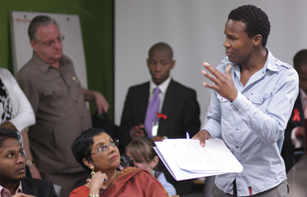
Feature Story
Young people key to reversing the global AIDS epidemic and leading the response
27 July 2011
27 July 2011 27 July 2011
Young leaders and government policy-makers discussing commitments made regarding young people and the AIDS response. UN HQ, New York. 26 July 2011.
Credit: UNFPA
A new report highlights that global commitments will be achieved only if the unique needs of young women and men are acknowledged and their human rights fulfilled, respected, and protected.
The Global Inter-Agency Task Team on HIV and Young People launched the synthesis report entitled Securing the Future Today containing strategic information about HIV and young people. The report was launched at an event organized by UNAIDS on the sidelines of the United Nations High-level Meeting on Youth which took place in New York from 25-26 July under the theme “Youth: Dialogue and mutual understanding”.
The side event, convened in collaboration with UNFPA, ILO, Global Youth Coalition on HV/AIDS, Population Council and Catholic Relief Services, brought together young leaders and government policy-makers to discuss commitments made regarding young people and the AIDS response. Participants looked for solutions to reach a shared vision of “Zero new HIV infections, Zero discrimination and Zero AIDS-related deaths” among young people.
In order to reduce new HIV infections among young people, achieve the broader equity goals set out in the MDGs and begin to reverse the epidemic, HIV prevention and treatment efforts must be tailored to the specific needs of young people.
Recent epidemiology data from UNAIDS indicates that young people are leading the HIV prevention revolution by taking action to protect themselves from HIV. Young people’s sexual behaviors are changing and HIV prevalence among young people is dropping in 15 of the 21 countries most affected by HIV. However, in 2009, young people accounted for 41% of all new HIV infections among adults with 3 000 young people becoming newly infected with HIV each day. Also in 2009, 4.9 million young women and men were living with HIV worldwide.
The report highlights that young people are a key resource to reverse the global AIDS epidemic and lead the response in decades to come. But it stresses that the legal and policy barriers that prevent young people from accessing HIV services must be addressed, and young people should be engaged more effectively in the response.
In that sense, the side-event provided a platform for young people to have a direct dialogue with national Governments in order to encourage the scale up of HIV prevention and treatment services for young people as well as the active involvement and leadership of young people, including those living with HIV, in the AIDS response at all levels.
According to the new report, to effectively advance the response among young people, there is a need to increase investments. However, it also cautions that simply directing more resources will not increase HIV testing and uptake of services among young people. Instead, empowering young people and particularly young women to exercise their rights to sexual and reproductive health, improve programmes for young people and repeal national laws and policies that restrict access to HIV services for young people is required to protect future generations from HIV.
Publications
Related
 “Who will protect our young people?”
“Who will protect our young people?”

02 June 2025


